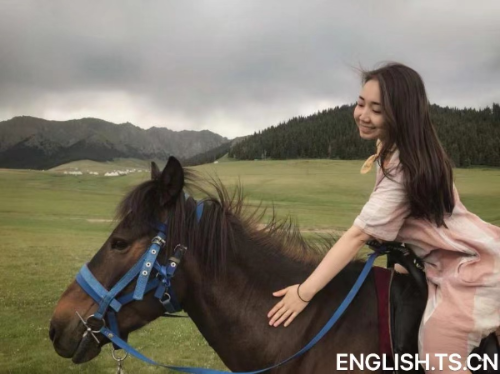My name is Kurmantaeva Medina and I am 29 years old. I was born in the picturesque city of Osh, Kyrgyzstan. In 2014, I embarked on a journey to Guangzhou to participate in a Chinese language competition. It was during this experience that I discerned the differences between Kyrgyzstan and China, which subsequently ignited my aspiration to pursue further studies in China.
I have had the opportunity to visit various countries, including Russia, Ukraine, Sri Lanka, and the United Arab Emirates. Additionally, I have explored numerous cities in China such as Beijing, Guangzhou, and Urumqi. Throughout my travels and research endeavors during this period of time, I extensively examined locations that are conducive for both studying and living. Consequently, based on my comprehensive findings from this research process, I made the decision to pursue my master's degree at Xinjiang University in Urumqi.
From 2017 to 2020, I pursued my master's degree and dedicated three years to the study of international politics at Xinjiang University. Upon my arrival in Xinjiang, I was captivated by its picturesque landscapes and distinctive cultural ambiance. However, what truly lingers in my memory is the diverse and delectable cuisine that Xinjiang has to offer. The steamed buns and soy milk served in the university cafeteria instantly won over my taste buds, as did the tantalizing hand-pulled noodles and pilaf unique to this region. Although I had previously tasted pilaf during my time in Kyrgyzstan, its flavor here differed significantly from that of my hometown. On one occasion while dining with classmates, I ordered a plate of pilaf but noticed it was not accompanied by a spoon. Observing those around me, I discovered that many were savoring it directly with their hands. Later on, a friend informed me that during weddings or banquets in Xinjiang, guests are traditionally encouraged to eat pilaf using their hands so as to fully experience its authentic taste.
In Xinjiang, I not only fell in love with the local delicacies, but also with the people and culture of the region. Every time I savor a dish, it's a close encounter with Xinjiang and an in-depth understanding of the land. The delicious food of Xinjiang connects me to this beautiful place and makes me feel at home in a foreign land.

Photo of Kurmantaeva Medina taken while she was in China.
The teachers and classmates at the school exhibit great enthusiasm and offer valuable assistance, readily supporting us in both our academic pursuits and daily life. Xinjiang University provides a comprehensive Chinese language program that facilitates our language acquisition and enhances our linguistic proficiency, enabling us to seamlessly integrate into the educational and social fabric of China. Moreover, it serves as an indispensable conduit for fostering a profound understanding of Chinese culture and facilitating effective communication with local residents.

Kurmantaeva Medina (left one) performs at Xinjiang University in northwest China’s Xinjiang Uygur Autonomous Region.
The indelible memory of the Mid-Autumn Festival I shared with my Chinese friends in 2018 remains vivid in my mind. Despite having acquired knowledge about this festival through textbooks, I was unprepared for the overwhelming festive ambiance that enveloped us. On that day, we ventured into the cafeteria and were greeted by an assortment of mooncakes, offering me a delightful opportunity to savor various flavors for the first time. Later in the evening, while strolling across the playground, I witnessed numerous classmates releasing sky lanterns into the night sky. Serendipitously, I encountered my dear Chinese friend Wang Xiao who extended an invitation to join him in this enchanting tradition. Together, we inscribed our heartfelt wishes on those ethereal lanterns; mine bore a simple yet profound message of 'peace.' As our sky lantern ascended towards the moon, an overwhelming sense of joy engulfed us both. I know that Xinjiang is geographically connected to the Central Asian countries and culturally intertwined with them. On this reunion day, we all bask in the moonlight and pray for peace. Here, different cultures intertwine to create a harmonious and beautiful tapestry.
As an international student, this Mid-Autumn Festival has become a cherished memory in my life. It has provided me with a profound understanding of Chinese traditional culture and fostered a deep affection for Xinjiang, the land that has embraced me with countless acts of kindness and touched my heart. While sitting on the playground engaged in conversations, I couldn't help but yearn for my family back in Kyrgyzstan; however, simultaneously, I also experienced immense warmth and happiness within this large Xinjiang family.
Thanks to the support of the Chinese government, I was granted a full scholarship for my master's degree. During my time here, I have had the privilege of forming valuable friendships and overcoming numerous challenges while studying alongside both Chinese students and international students from diverse backgrounds. These years have not only marked significant academic achievements but also facilitated a profound understanding of the culture, history, and essence of this region.
Xinjiang is a region where the convergence of Eastern and Western cultures gives rise to a unique coexistence of diverse cultural traditions. With its awe-inspiring natural landscapes ranging from majestic mountains to vast deserts, Xinjiang serves as a pivotal crossroads of civilizations, preserving countless legends and traditions that have been passed down through generations.
Xinjiang is renowned as a land of song and dance, where every corner is filled with the melodies and rhythms of folk art. The land here generously receives gifts from nature, with fruits and vegetables being juicy, tender, and delicious that people have written poems about them. The gemstones on local jewelry seem to absorb the brilliance of the sun and the secrets of time, while the carpets woven by craftsmen are true works of art that reflect centuries-old traditions in this region. Xinjiang is truly a treasure trove where everyone can find something unique.

Kurmantaeva Medina experiences horseback riding in the Nanshan Mountain of Urumqi, in northwest China’s Xinjiang Uygur Autonomous Region.
The diligence of Chinese people in Xinjiang is a remarkable discovery I made, which offers valuable lessons for learning. In China, every city possesses its own unique history, culture, and even dialects. As international students, it is essential for us to acquire Mandarin proficiency.
The formative years of my life were spent in China, where I navigated the journey alone. My personal development has been profoundly shaped by influential educators who have broadened my perspective on the world and introduced me to diverse individuals along the way. I firmly believe that these experiences collectively contribute to our individual growth. Undoubtedly, China's profound impact on me has fostered a strong sense of independence within myself.
The unique charm of Xinjiang has provided me with enriching and diverse experiences, as well as valuable insights, deepening my understanding and love for China during my study abroad journey. Xinjiang has broadened my horizons and stimulated my critical thinking. These cherished moments will forever remain in my heart. I express gratitude to China and Xinjiang for this unforgettable experience.
Kurmantaeva Medina is now a professional translator working in Kazakhstan.
Planner : Jie Wenjin
Reviewers : Hou Weili and Wang Xiabing
Editors: Gvlzar Mijit and Marziye Nurshat









